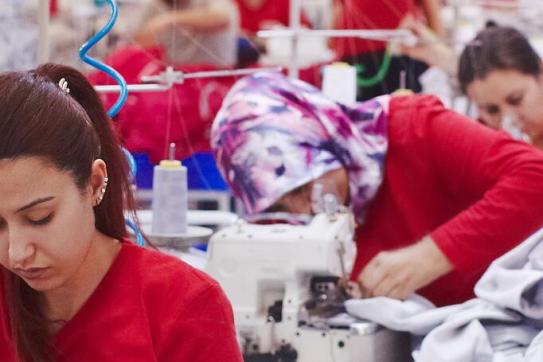Western consumers and governments are increasingly demanding that goods produced overseas be manufactured under safe working conditions. Incidents like the 2013 collapse of the Rana Plaza garment factory in Bangladesh, which killed 1,134 people and injured thousands more, have contributed to this growing public pressure on multinational corporations. Developing countries, however, often struggle to enforce labor laws due in large part to the government’s limited capacity to provide oversight and ensure compliance. This has led many multinationals, who source products from these factories, to undertake their own enforcement regimes.
In “Multinational enforcement of labor law: Experimental evidence from Bangladesh’s apparel sector,” Laura Boudreau, Postdoctoral Fellow at the Jerome A. Chazen Institute for Global Business, examined a group of multinational buyers’ efforts to hold their suppliers to higher labor standards — and found that specific interventions improved workplace safety with no detectible sacrifice in terms of overall factory efficiency.
Boudreau collaborated with the Alliance for Bangladesh Worker Safety, a coalition of North American multinational retail and apparel companies, including Wal-Mart and Target. Her research tested the effectiveness of privately enforcing a recent amendment to a labor law that mandated worker-manager safety committees, which was passed in response to the Rana Plaza collapse by the Government of Bangladesh.
Through a randomized controlled trial, the researcher measured the Alliance’s enforcement of the safetycommittee mandate in 84 factories over a ten-month period. Roughly half of the factories were randomly assigned to participate immediately in the enforcement program, while the other half was assigned to deferred participation 11 months later.
Among the safety committees’ activities were holding regular inspections, developing action plans for correcting infractions, and training workers on safe workplace practices. If factories did not comply, they would be at increased risk of suspension from Alliance members’ supplier bases, which could be a major blow to that factory’s business operations.
The study found that the enforcement program significantly improved suppliers’ compliance with the local labor law. Under the Alliance’s enforcement, safety committees became much more active. For example, the number of committees that had ever conducted a risk assessment rose from about 15 percent to nearly 60 percent. Additionally, indicators of factory safety improved, such as workers regularly wearing protective gear when performing their tasks.
Interestingly, the Alliance’s enforcement intervention dramatically improved compliance and safety in factories that had better managerial practices, but not in factories with poor managerial practices. And worse still, workers at poorly managed factories reported feeling more dissatisfied in their jobs. However, this study found no evidence of adverse effects on labor productivity, employment, or wages.
Boudreau stresses that, while these interventions show notable improvements inside factories, particularly when there is weak enforcement by the state, enforcement by multinational buyers is a short-to-medium term solution. In the long-term, it is essential to build the government’s capacity for full-sector enforcement.
